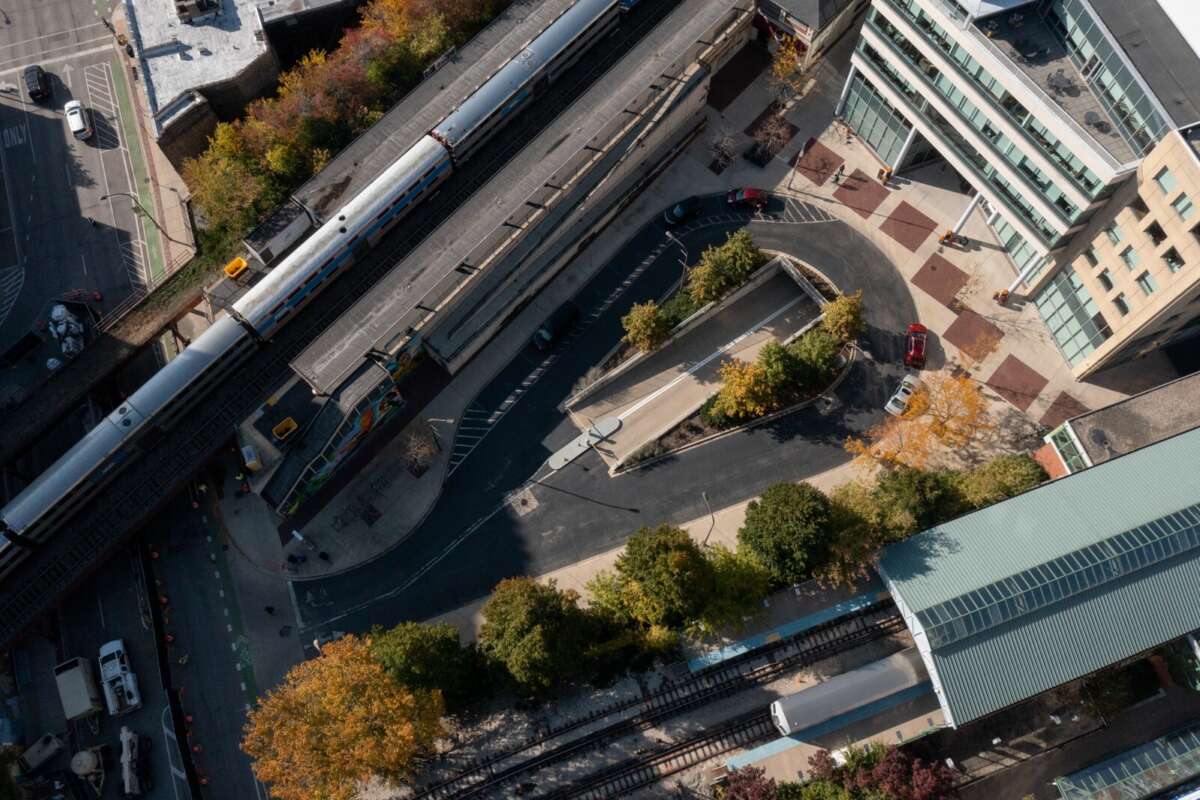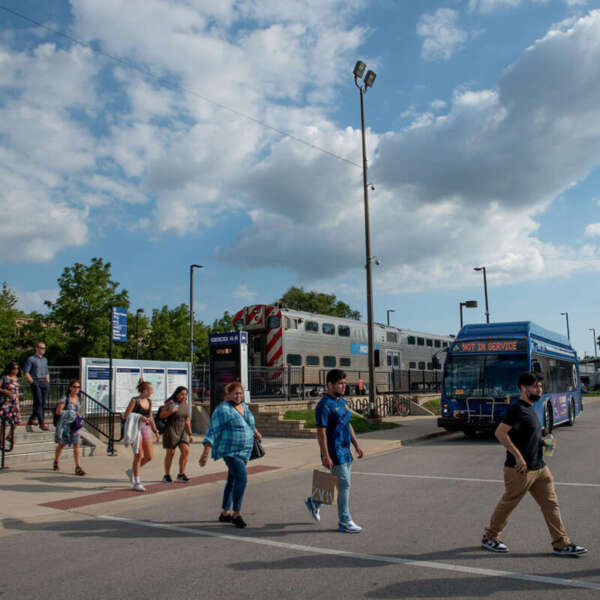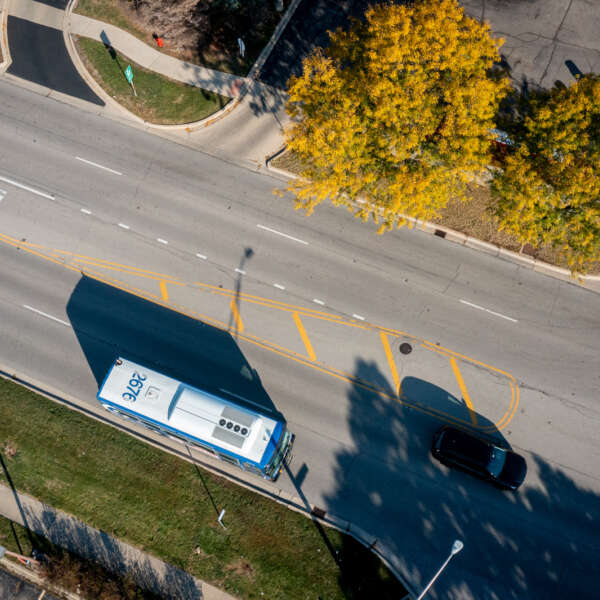What Illinois can learn from transit funding packages in peer states
August 24, 2023
August 24, 2023

Public transit plays an essential role in the lives of millions of riders across the Chicago region and has the potential to reach even more people — but the system has been drastically underfunded for decades. This lack of funding has been exacerbated in recent years because of pandemic-induced drops in ridership and fare revenue.
While significant ridership recovery has occurred, permanent changes in remote and hybrid work are projected to result in lower levels of ridership for the remainder of the decade compared to 2019. Beginning in 2026, the RTA system is facing a projected $730 million annual budget gap. At nearly 20% of the annual operating budget, this gap, if unaddressed, would drastically impact current service and fares, and prohibit any additional improvements to the regional system.
The RTA system is not alone in facing many of its current challenges. Large transit systems across the US are facing proportionally similar funding gaps as they draw down remaining federal COVID relief funds, many facing shorter timelines than our region. Every major transit agency across the country has been able to continue operations because of this relief funding, and all are working to find solutions to fill their budget gaps before they hit their own fiscal cliffs when that funding is depleted. Three states have already taken action to provide new revenues for transit. Action taken at the state level to support peer agencies will provide valuable insights into how the RTA can continue to advocate for additional public funding as the fiscal cliff approaches.
Big city agencies like Chicago’s are facing these significant operating deficits because their budgets are heavily reliant on fares. While small and midsize agencies already secure 80% or more of their operating funding from federal, state, and local governments, regions like Chicago have traditionally been expected to raise as much as 50% of our operating revenue from fares.
Transit is the Answer calls for the RTA to work with regional partners and stakeholders to secure increased funding for transit operations and develop a funding structure that is less reliant on fares. This would allow us to not only avoid severe fare hikes and service cuts, but ultimately improve service, grow ridership, and create a more equitable system.
Three states have taken action to support their transit systems through recent budget packages. Highlights of each package provide an early look at what others are doing to help inform how the RTA should pursue solutions for our region.
Spurred by advocacy from the California Transit Association, California’s legislature passed a package that provides $5.1 billion to the states’ 300+ transit agencies over the next 4 years. This is forecasted to cover operations for 1-2 years before more funding will need to be sought.
More details:
Governor Hochul championed new funding for transit in her budget proposals early on, and the final budget includes nearly $4.5 billion in one-time and ongoing revenues to the Metropolitan Transit Authority projected to fill their budget gap until at least 2027.
More details:
Minnesota had not passed a state capital bill since 2008, so there was significant momentum behind taking bold action in support of transportation this session. The final package pairs an $8.8 billion state capital bill with dedicated, ongoing revenue for Metro Transit operations.
More details:
While this is only a small subset of the agencies that will ultimately have to take action to address their fiscal cliffs, a few basic takeaways can be gathered from their examples:
The RTA will continue to monitor legislation affecting peer systems as it advances to help inform our own strategies moving forward, but we know that we cannot do this alone. Join our coalition to take future action and advocate with us for solutions.
Subscribe to our Newsletter
Related Articles
 Transit station activation in Uptown brings positive presence to Broadway bus route with weekly outdoor yoga class
Transit station activation in Uptown brings positive presence to Broadway bus route with weekly outdoor yoga class
On Friday mornings now through the end of the year, CTA #36 and #81 bus riders and Red Line passengers through the Uptown neighborhood of Chicago may catch a...
July 25, 2024 Join the RTA Transit is the Answer Coalition to discuss possible reforms to improve service and accountability for riders
Join the RTA Transit is the Answer Coalition to discuss possible reforms to improve service and accountability for riders
Following the introduction of legislation that proposes changes to how the Chicago region’s transit agencies are organized, the RTA continues to lead convers...
July 15, 2024 RTA releases new fare equity report, recommending fully funding and expanding reduced fare programs
RTA releases new fare equity report, recommending fully funding and expanding reduced fare programs
A new report released by the RTA in July, Building a More Equitable Fare Structure for Public Transit in the Chicago Region, recommends that the state legisl...
July 11, 2024 Homewood, Richton Park adopt transit-oriented development plans funded through RTA Community Planning program
Homewood, Richton Park adopt transit-oriented development plans funded through RTA Community Planning program
This spring, transit-oriented development (TOD) plans were adopted by the villages of Homewood and Richton Park that will make these communities more transit...
July 11, 2024 Good news: Regional transit ridership reaches new high as CTA, Metra, and Pace increase service, offer new fare products
Good news: Regional transit ridership reaches new high as CTA, Metra, and Pace increase service, offer new fare products
Ridership across Chicago’s transit system has continued to increase, with May 2024 seeing the highest ridership levels since 2019 for CTA, Metra, and Pace. T...
June 28, 2024 Legislative Update: Lawmakers pass state budget, action on transit funding still needed ahead of fiscal cliff
Legislative Update: Lawmakers pass state budget, action on transit funding still needed ahead of fiscal cliff
The Illinois General Assembly adjourned this year’s spring legislative session after passing an overall $53.1 billion budget for State Fiscal Year (SFY) 2025...
June 27, 2024